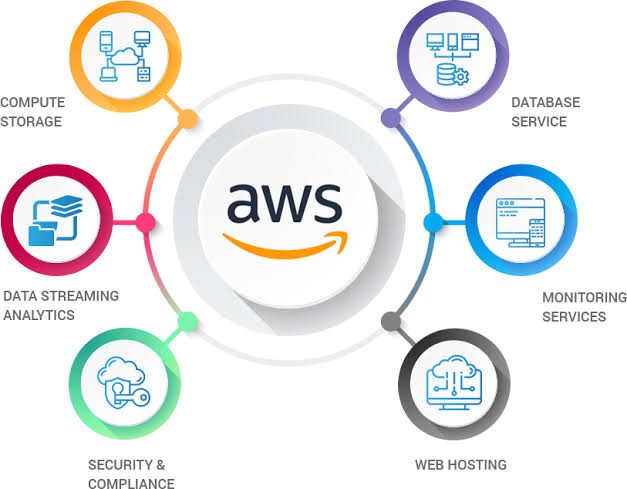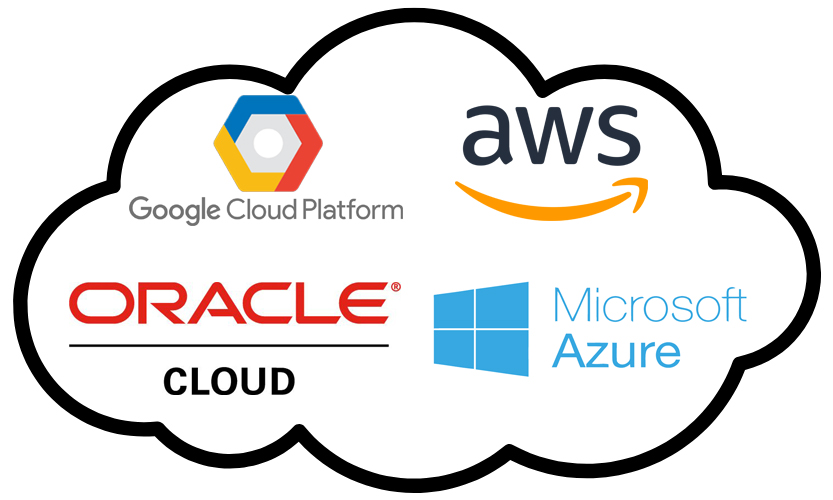The cloud refers to the delivery of computing services such as storage, databases, servers, networking, and software over the internet ("the cloud") instead of through local infrastructure. It offers on-demand access, scalability, and cost-efficiency by allowing users to pay only for the resources they use.


The largest cloud service provider, offering a wide range of services like compute (EC2), storage (S3), databases (RDS), networking (VPC), machine learning (SageMaker), and serverless computing (Lambda). Known for scalability, global infrastructure, and broad service offerings.
A popular cloud platform with strong integration with Microsoft products like Windows Server, SQL Server, and Office 365. Provides services for compute, storage, databases, AI, DevOps, and hybrid cloud solutions.
Google's cloud service with a focus on big data, machine learning, and AI. Known for services like BigQuery (data analytics), Kubernetes Engine (container orchestration), and Compute Engine (virtual machines).
Offers IaaS, PaaS, and SaaS solutions with a focus on AI, blockchain, and quantum computing. Known for its integration with on-premises systems and enterprise-grade solutions.
Provides cloud solutions focused on enterprise customers, especially in databases and applications. Known for its Autonomous Database and ERP systems integration.
China’s largest cloud provider, offering a comprehensive range of services such as compute, storage, networking, and data analytics. Known for its strong presence in Asia and focus on AI and big data.
Each provider has unique strengths and is geared toward different needs depending on the organization’s existing infrastructure and goals.
Organizations are increasingly adopting hybrid (mix of on-premises and cloud) and multi-cloud (using multiple cloud providers) strategies to optimize costs, improve resilience, and avoid vendor lock-in.
Cloud providers are pushing processing power closer to the end-user with edge computing. This reduces latency and improves performance for IoT devices, autonomous vehicles, and real-time applications.
Serverless services like AWS Lambda and Azure Functions are gaining traction. This model allows developers to build applications without managing servers, offering scalability, cost-efficiency, and faster development cycles.
Cloud providers are expanding their AI and ML offerings, making it easier for organizations to integrate intelligent analytics, automation, and decision-making into their operations.
With the increase in data breaches, there is a growing focus on security tools, encryption, and compliance services offered by cloud platforms to protect sensitive data and meet regulatory requirements.
The use of containers and Kubernetes for managing applications is growing, offering developers more flexibility, scalability, and consistency in cloud-native app development.
Cloud providers are investing in renewable energy and eco-friendly data centers to minimize the environmental impact of cloud computing and achieve sustainability goals.
Quantum computing services, like those offered by IBM and AWS, are becoming more accessible, allowing businesses to experiment with solving complex problems far beyond the capabilities of classical computers.
These trends are shaping the future of cloud computing, driving innovation, and enhancing how organizations deploy technology.
Start by grasping basic cloud concepts, including deployment models (public, private, hybrid) and service models (IaaS, PaaS, SaaS). Familiarity with core cloud services offered by major providers (AWS, Azure, GCP) is essential.
Identify an area of focus based on your interests, such as cloud architecture, cloud security, DevOps, data engineering, or cloud development. Specializing can enhance your job prospects and expertise.
Pursue relevant cloud certifications to validate your skills and knowledge. Popular certifications include AWS Certified Solutions Architect, Microsoft Certified: Azure Solutions Architect, and Google Cloud Professional Cloud Architect.
Gain practical experience through labs, projects, and internships. Building your own cloud-based applications or contributing to open-source projects can strengthen your portfolio.
Join cloud computing communities, attend industry conferences, and participate in meetups. Networking with professionals can lead to job opportunities and mentorship.
The cloud landscape evolves rapidly, so stay informed about emerging technologies, trends, and best practices through online courses, blogs, webinars, and industry news.
Enhance communication, teamwork, and problem-solving skills, which are critical for success in cloud roles, as they often involve collaboration across teams and departments.
Create a portfolio showcasing your projects, certifications, and skills. This can be a valuable asset during job applications and interviews.
AWS Cloud is popular due to its comprehensive range of services, global infrastructure, security features, and scalability. It supports businesses of all sizes by offering flexible, reliable, and cost-effective cloud solutions for everything from simple website hosting to complex machine learning and data processing applications.
AWS cloud computing career is rapidly growing as businesses increasingly adopt cloud services for their operations. With AWS offering a wide range of services like EC2, S3, and RDS, professionals with skills in cloud architecture, infrastructure management, and data storage are in high demand. Those pursuing an AWS cloud computing career can expect diverse opportunities in fields such as DevOps, security, and machine learning.
Learning cloud computing is essential in today's tech-driven world, as it enables businesses to operate more efficiently, scale easily, and reduce IT costs. Cloud expertise is in high demand, offering lucrative career opportunities across industries.
AWS is the market leader in cloud computing, offering a vast range of services, global infrastructure, and trusted security. By learning AWS, individuals gain access to a flexible, widely-used platform that supports innovation, making it a valuable skill for roles in cloud architecture, DevOps, data science, and more.
🎯 Learn In-Demand Skills & Stay Ahead.
Familiarity with cloud computing concepts involves understanding the fundamental principles and models of cloud services, including Infrastructure as a Service (IaaS), Platform as a Service (PaaS), and Software as a Service (SaaS). It encompasses knowledge of deployment models such as public, private, and hybrid clouds, along with key concepts like virtualization, scalability, elasticity, and multi-tenancy. Understanding security, compliance, and data management in the cloud is also crucial. This foundational knowledge is essential for effectively leveraging cloud technologies and making informed decisions in cloud architecture and implementation.
As the need for scalable and cost-efficient cloud solutions grows, an AWS cloud computing career becomes more appealing to IT professionals. By gaining AWS certifications and hands-on experience, individuals can secure lucrative roles in industries ranging from healthcare to finance. The flexibility and innovation provided by AWS services make an AWS cloud computing career an excellent path for those looking to specialize in modern cloud technologies.
Proficiency in networking involves understanding how data is transmitted across networks, including concepts like IP addressing, subnets, routing, and firewalls. This knowledge is essential for managing cloud infrastructures, ensuring secure and efficient communication between resources.
Programming knowledge, particularly in languages like Python, Java, or JavaScript, is crucial for automating cloud tasks, developing applications, and integrating services. Familiarity with scripting and automation tools enhances the ability to deploy and manage cloud resources effectively, enabling developers and IT professionals to streamline operations and implement solutions efficiently in cloud environments.
DevOps is a cultural and technical movement that combines software development (Dev) and IT operations (Ops) to enhance collaboration, increase deployment frequency, and improve software quality. It emphasizes automation, continuous integration and delivery (CI/CD), and monitoring, enabling teams to respond quickly to changes and deliver value to users efficiently.
Containerization involves encapsulating applications and their dependencies into containers, which provide a consistent environment for development, testing, and deployment. Tools like Docker and Kubernetes facilitate container orchestration, allowing for easier scalability and management of microservices architectures.
Machine Learning (ML) refers to the use of algorithms and statistical models that enable computers to perform tasks without explicit programming by learning from data. In cloud computing, ML services (like AWS SageMaker) provide scalable resources and tools for building, training, and deploying machine learning models, empowering organizations to leverage data for insights and decision-making. Together, these technologies drive innovation and enhance the capabilities of modern applications.
(e.g., MySQL, PostgreSQL) that use structured query language (SQL) for data manipulation, and NoSQL databases (e.g., MongoDB, Cassandra) that are designed for unstructured data and scalability.
Key concepts include data modeling, normalization, indexing, transactions, and database design principles. Knowledge of database management systems (DBMS) enables individuals to efficiently manage data, ensure data integrity, and optimize performance. This skill is essential for roles in software development, data analysis, and cloud computing, where data storage and retrieval play a critical role in application functionality and performance.
Confused about our certifications?
Let Our Advisor Guide You